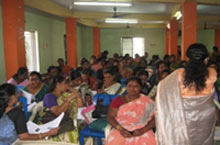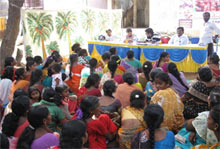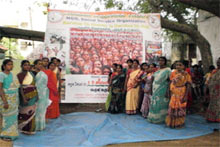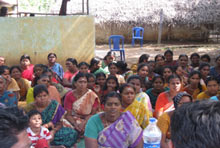Women Welfare Awareness
Women’s rights are the rights and entitlements claimed for women and girls of many societies worldwide.
Women is the One who are basically are kind hearted, loveable and show lot affection towards other and she sacrifices a lot in the life for the welfare of others and good friend and she is also very strong and stable in nature and has lot of self confidence and very calculate and less spending in nature and there are also good advisor and are good leader, though she come across lot of problem from the Child hood till her death even thought from the ancient days till today Women was treated as slaves , sole property of father, brother or husband and totally dependent on the anyone them and was not allowed to come out the home and not given a choice or freedom of her own.

Women is the One who are basically are kind hearted, loveable and show lot affection towards other and she sacrifices a lot in the life for the welfare of others and good friend and she is also very strong and stable in nature and has lot of self confidence and very calculate and less spending in nature and there are also good advisor and are good leader, though she come across lot of problem from the Child hood till her death even thought from the ancient days till today Women was treated as slaves , sole property of father, brother or husband and totally dependent on the anyone them and was not allowed to come out the home and not given a choice or freedom of her own.Women’s rights are the rights and entitlements claimed for women and girls of many societies worldwide.
Ancient cultures
While in many ancient cultures males seem to have dominated, there are some exceptions. For instance in the Nigerian Aka culture women may hunt, even on their own, and often control distribution of resources. In the ancient days the women had come across the lot evils Crisis like child Marriage, sati, Jauhar and Restriction from education. But the trend slowing started changing and society started given importance to women by given first preference in all aspect this is many because of the NGO, govt came forward and took step and worked together for welfare and development women and done by conducting awareness program.

Human welfare trust is conducting awareness program and working towards the upliftment of women position by Conducting a campaign and door to door visit and bringing awareness among the people about the importance of women , Human welfare trust is working On the basic women rights , free education, free training, equality, eradication of child marriage health and well being, women labour and employment, marginalization of women, Marriage and family life, eradication of prostitution, gender issues, religion and culture, reproductive right, violence against women, women and empowerment, women rights in general.
Natural law and women’s rights
17th century natural law philosophers in Britain and America, such as Thomas Hobbes, Jean-Jacques Rousseau and John Locke, developed the theory of natural rights in reference to ancient philosophers such as Aristotle and the Christian theologist Aquinas. Like the ancient philosophers, 17th century natural law philosophers defended slavery and an inferior status of women in law. Relying on ancient Greek philosophers, natural law philosophers argued that natural rights were not derived from god, but were “universal, self-evident, and intuitive”, a law that could be found in nature. They believed that natural rights were self-evident to “civilised man” who lives “in the highest form of society”. Natural rights derived from human nature, a concept first established by the ancient Greek philosopher Zeno of Citium in Concerning Human Nature. Aristotle developed the widely adopted idea of rationality, arguing that man was a “rational animal” and as such a natural power of reason. Concepts of human nature in ancient Greece depended on gender, ethnic, and other qualifications and 17th century natural law philosophers came to regard women along with children, slaves and non-whites, as neither “rational” nor “civilised”. Natural law philosophers claimed the inferior status of women was “common sense” and a matter of “nature”. They believed that women could not be treated as equal due to their “inner nature”. The views of 17th century natural law philosophers were opposed in the 18th and 19th century by evangelical natural theology philosophers such as William Wilberforce and Charles Spurgeon, who argued for the abolition of slavery and advocated for women to have rights equal to that of men.

Modern natural law theorist, and advocates of natural rights, claim that all people have a human nature, regardless of gender, ethnicity or other qualifications, therefore all people have natural rights.
- Human welfare trust is working towards women communities suffering from great distress, discrimination and marginalization women.
- Human welfare trust is providing free education to SC/ST girl child, and the women below the poverty line and poor sector living in the rural and urban area.
- we provide the free computer education specially for the women below poverty line
- Provide the self employment for the women who are left by their husband or Widow by giving the free training in the various aspects.
- Providing scholarship for the Girl child for their higher education.
- We enhance outreach programs on a variety of issues at the grassroots level.
- Free health check for the women below poverty line and poor sector of rural and urban area.
- We Providing opportunity to SC/ST and back ward community women for their self employment by helping in getting financial support through the government banks
- We provide free legal advice for the affect women in the society and give voice for justices and come forward for the upliftment of women’s position in the society.
- By this awareness program the literacy rate of women education and work opportunity and position is increased from 58% to 75%.

Women Counselling
Sexual harassment is a type of harassment involving the use of explicit or implicit sexual overtones, including the unwelcome or inappropriate promise of rewards in exchange for sexual favors. Sexual harassment includes a range of actions from verbal transgressions to sexual abuse or assault. Harassment can occur in many different social settings such as the workplace, the home, school, churches, etc. Harassers or victims may be of any gender.
In most modern legal contexts, sexual harassment is illegal. Laws surrounding sexual harassment generally do not prohibit simple teasing, offhand comments, or minor isolated incidents—that is due to the fact that they do not impose a "general civility code." In the workplace, harassment may be considered illegal when it is frequent or severe thereby creating a hostile or offensive work environment or when it results in an adverse employment decision (such as the victim's demotion, firing or quitting). The legal and social understanding of sexual harassment, however, varies by culture.
Sexual harassment by an employer is a form of illegal employment discrimination. For many businesses or organizations, preventing sexual harassment and defending employees from sexual harassment charges have become key goals of legal decision-making.
Laws, state support, and legal issues
The Sexual Harassment of Women at Workplace (Prevention, Prohibition and Redressal) Act, 2013 is a legislative act in India that seeks to protect women from sexual harassment at their place of work. It was passed by the Lok Sabha (the lower house of the Indian Parliament) on 3 September 2012. It was passed by the Rajya Sabha (the upper house of the Indian Parliament) on 26 February 2013. The Bill got the assent of the President on 23 April 2013. The Act came into force from 9 December 2013. This statute superseded the Vishaka Guidelines for Prevention Of Sexual Harassment (POSH) introduced by the Supreme Court (SC) of India. It was reported by the International Labour Organization that very few Indian employers were compliant to this statute. Most Indian employers have not implemented the law despite the legal requirement that any workplace with more than 10 employees need to implement it. According to a FICCI-EY November 2015 report, 36% of Indian companies and 25% among MNCs are not compliant with the Sexual Harassment Act, 2013. The government has threatened to take stern action against employers who fail to comply with this law.
Major features
- The Act defines sexual harassment at the work place and creates a mechanism for redressal of complaints. It also provides safeguards against false or malicious charges.
- The Act also covers concepts of 'quid pro quo harassment' and 'hostile work environment' as forms of sexual harassment if it occurs in connection with an act or behaviour of sexual harassment.
- The definition of "aggrieved woman", who will get protection under the Act is extremely wide to cover all women, irrespective of her age or employment status, whether in the organised or unorganised sectors, public or private and covers clients, customers and domestic workers as well.
- An employer has been defined as any person who is responsible for management, supervision, and control of the workplace and includes persons who formulate and administer policies of such an organisation under Section 2(g).
- While the "workplace" in the Vishakha Guidelines is confined to the traditional office set-up where there is a clear employer-employee relationship, the Act goes much further to include organisations, department, office, branch unit etc. in the public and private sector, organized and unorganized, hospitals, nursing homes, educational institutions, sports institutes, stadiums, sports complex and any place visited by the employee during the course of employment including the transportation. Even non-traditional workplaces which involve tele-commuting will get covered under this law.
- The Committee is required to complete the inquiry within a time period of 90 days. On completion of the inquiry, the report will be sent to the employer or the District Officer, as the case may be, they are mandated to take action on the report within 60 days.
- Every employer is required to constitute an Internal Complaints Committee at each office or branch with 10 or more employees. The District Officer is required to constitute a Local Complaints Committee at each district, and if required at the block level.
- The Complaints Committees have the powers of civil courts for gathering evidence.
- The Complaints Committees are required to provide for conciliation before initiating an inquiry, if requested by the complainant.
- The inquiry process under the Act should be confidential and the Act lays down a penalty of Rs 5000 on the person who has breached confidentiality.
- The Act requires employers to conduct education and sensitisation programmes and develop policies against sexual harassment, among other obligations. The objective of Awareness Building can be achieved through Banners and Poster displayed in the premises, eLearning courses for the employees, managers and Internal Committee members, Classroom training sessions, Communication of Organizational Sexual Harassment Policy through emails, eLearning or Classroom Training. It is recommended that the eLearning or Classroom Training be delivered in the primary communication language of the employee.
- Penalties have been prescribed for employers. Non-compliance with the provisions of the Act shall be punishable with a fine of up to ₹ 50,000. Repeated violations may lead to higher penalties and cancellation of licence or deregistration to conduct business.
- Government can order an officer to inspect workplace and records related to sexual harassment in any organisation. Under the Act, which also covers students in schools and colleges as well as patients in hospitals, employers and local authorities will have to set up grievance committees to investigate all complaints. Employers who fail to comply will be punished with a fine of up to 50,000 rupees.
For more details visit
http://india.gov.in/topics/social-development/women
http://wcd.nic.in/
https://www.tn.gov.in/government/keycontact/81162
https://www.pmindia.gov.in/en/interact-with-honble-pm/
https://rb.nic.in/epmfs/ctzn/home
https://nhrc.nic.in/
http://ncw.nic.in/important-links/List-of-Laws-Related-to-Women
https://ta.vikaspedia.in/social-welfare/baabc6ba3bcdb95bb3bcd-baebb1bcdbb1bc1baebcd-b95bc1bb4ba8bcdba4bc8b95bb3bcd-ba8bb2baebcd/baeb95bb3bbfbb0bcd-ba8bb2-baebc7baebcdbaabbeb9fbc1/ba4baebbfbb4bcd-ba8bbeb9fbc1-baebbeba8bbfbb2-baeb95bb3bbfbb0bcd-b86ba3bc8bafbaebcd
https://nhrc.nic.in/press-release/women%E2%80%99s-human-rights-cell-nhrc
metoodcw@gmail.com
